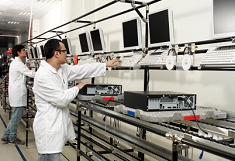Electronic Distribution Services FAQ

What are electronics and semiconductor distributors?
Semiconductors and electronic components are the
building blocks for all computers and high-tech
machinery and are used in a multitude of products
from video games to communication equipment to
automobile systems.
Companies that buy, sell, market, and resell
semiconductors, electronic components and computer
products on a business-to-business basis are
considered distributors. Since the early 1980's, the
electronics distribution marketplace has been
growing at a phenomenal pace.
How does the semiconductor and electronic component distribution marketplace work?
The sale of semiconductors and other electronic
products is broken down into three "tiers." This
system has evolved significantly over the past
decade as the result of a complex chain of supply
and demand.
- The first tier makes up the vast majority of sales. These are sales direct from Manufacturers such as chipmakers AMD, Intel, and Samsung to OEMs (Original Equipment Manufacturers) such as Compaq, Dell, and Sony. The OEMs, in turn, use the components to manufacture end-user products such as PCs and televisions.
- The second tier is primarily Franchised Distributors who market and distribute semiconductors and electronic products to OEMs on behalf of the Manufacturers.
- The third tier consists of all other distribution outlets. Major players at this level are the Independent Distributors, Surplus Resellers, smaller Brokers, and Value-added Resellers. Major customers include OEMs, Contract Manufacturers, and other Distributors.
What does an Independent Distributor do?
An Independent Distributor operates on a
brokerage business model and buys and sells
semiconductors, electronic components, and computer
products on the "open-market" much in the same way
other commodities are traded.
A customer places an order and an Independent
Distributor sources the product based upon
availability and inventory. This means Independent
Distributors can provide product quickly which is
particularly advantageous when a customer is trying
to reduce inventories or meet production deadlines
and does not want to have a "down [production]
line."
What is the difference between a Franchised and an Independent Distributor?
A Franchised Distributor has formal agreements to
buy and sell specific Manufacturer product lines at
set prices with agreed upon lead times. And, they
must do so for delivery on specific dates and,
sometimes, for sale within limited geographic
regions. Franchised Distributors generally carry
more products in stock but have a limited number of
manufacturers and product lines.
An Independent Distributor, on the other hand, does
not have formal agreements with any specific
manufacturer. This provides flexibility in
purchasing from a variety of sources and on a time
schedule the Independent Distributor demands. An
Independent Distributor also purchases and resells
excess and obsolete inventories. Customers typically
purchase from both Franchised and Independent
Distributors based upon their particular time and
sourcing requirements.
What is the difference between an Independent Distributor and a Broker?
Although they may operate on similar business
models, Independent Distributors generally stock
product, offer their customers credit terms, provide
value-added services, honor manufacturers'
warranties, provide RMA services, and have strict
quality assurance. Brokers usually act only as
agents for their customer in return for a fee.
Top-level Independent Distributors, such as Global Source Technology, invest significant resources to expand
infrastructure, hire personnel, and develop markets.
These investments enable top Independents to grow
their businesses with long-term plans and alliances.